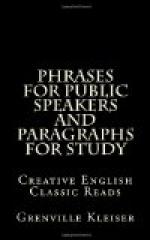PARAGRAPHS FROM NOTABLE SPEECHES
Let me here pause once more to ask whether the book in its genuine state, as far as we have advanced in it, makes the same impression on your minds now as when it was first read to you in detached passages; and whether, if I were to tear off the first part of it, which I hold in my hand, and give it to you as an entire work, the first and last passages, which have been selected as libels on the Commons, would now appear to be so when blended with the interjacent parts? I do not ask your answer—I shall have it in your verdict. Thomas lord Erskine.
From “Speech in Behalf of Stockdale.”
* * * * *
Indeed, many of the statements we now read of the necessity of the wise governing the weak and ignorant are almost literal reproductions of the arguments advanced by the slaveholders of the South in defence of slavery just preceding the outbreak of the Civil War. That divergence from our original ideal produced the pregnant sayings of Mr. Lincoln, “A house divided against itself can not stand,” and its corollary, “This nation can not permanently endure half slave and half free.” He saw dearly that American democracy must rest, if it continued to exist, upon the ethical ideal which presided over its birth—that of the absolute equality of all men in political rights. Wayne MACVEAGH.
From, “Ideals in American Politics.”
* * * * *
The idea of liberty is license; it is not liberty but it is license. License to do what? License to violate law, to trample constitutions under foot, to take life, to take property, to use the bludgeon and the gun or anything else for the purpose of giving themselves power. What statesman ever heard of that us a definition of liberty? What man in a civilized age has ever heard of liberty being the unrestrained license of the people to do as they please without any restraint of law or of authority? No man—no, not one—until we found the Democratic party, would advocate this proposition and indorse and encourage this kind of license in a free country. John Alexander Logan.
From “Self-government in Louisiana.”
* * * * *
My countrymen, we do not now differ in our judgment concerning the controversies of past generations, and fifty years hence our children will be divided in their opinions concerning our controversies. They will surely bless their fathers and their fathers’ God that the Union was preserved, that slavery was overthrown, and that both races were made equal before the law. We may hasten or we may retard, but we can not prevent the final reconciliation. Is it not possible for us now to make a truce with time, by anticipating and accepting its inevitable verdicts? Enterprises of the highest importance to our moral and material well-being invite us, and offer ample scope for the employment of our best powers. Let all our people, leaving behind them the battle-fields of dead issues, move forward, and, in the strength of liberty and a restored Union, win the grander victories of peace. James Abram Garfield.




